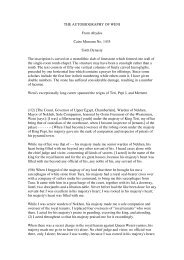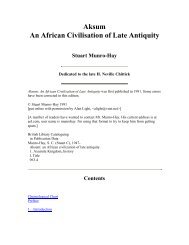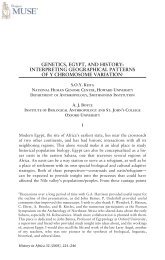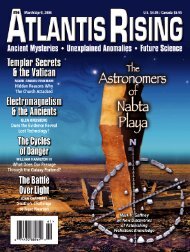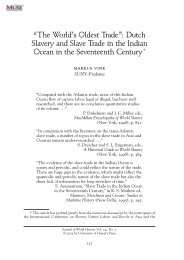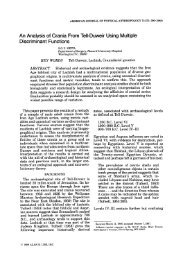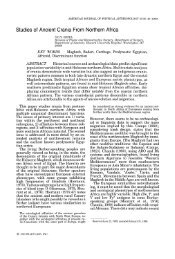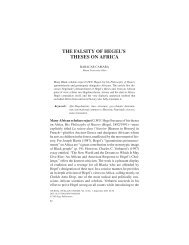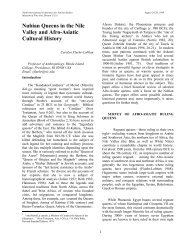The Negro trail blazers of California [microform] : a ... - Homestead
The Negro trail blazers of California [microform] : a ... - Homestead
The Negro trail blazers of California [microform] : a ... - Homestead
Create successful ePaper yourself
Turn your PDF publications into a flip-book with our unique Google optimized e-Paper software.
OF CALIFORNIA 41<br />
<strong>The</strong> true reason they did not wish either slave or free <strong>Negro</strong>es in <strong>California</strong> was<br />
because the question <strong>of</strong> slavery was then prominent before the public against the extension<br />
<strong>of</strong> the slave territory, and it was necessary to have a definite clause in their constitution<br />
deciding the issue before going before Congress to ask for Statehood for the Terri-<br />
.<br />
tory <strong>of</strong> <strong>California</strong>. If the question was not decided in <strong>California</strong> the probability <strong>of</strong><br />
Congress debating the issue or else ignoring their request, would have delayed the<br />
admission <strong>of</strong> the Territory into the Union. <strong>The</strong> settlers were anxious to secure a speedy<br />
admission and prevent the slaveholders from becoming rich in <strong>California</strong>'s gold through<br />
|<br />
the importation <strong>of</strong>, as one speaker said, these "living labor machines." <strong>The</strong>y were just<br />
like the citizen <strong>of</strong> today living in <strong>California</strong>, when they see some <strong>of</strong> the best vineyards<br />
in the State cultivated by a foreign race <strong>of</strong> people, they legislate to prevent the immigration<br />
<strong>of</strong> any more <strong>of</strong> their kind into the State. <strong>The</strong> question was the same and created the<br />
same kind <strong>of</strong> an issue.<br />
To prove the writer's statement that no one paid any attention to the <strong>Negro</strong> miner in<br />
<strong>California</strong> until after the Constitutional Convention, the following is quoted from Charles<br />
Shinn who, in his book on "Mining Camps," presents in an impartial way a study in<br />
American frontier government. He is considered an authority on the subject as there<br />
were a number <strong>of</strong> <strong>Negro</strong> miners at the time working at Placerville, Grass Valley, <strong>Negro</strong> f<br />
Bar and Mokelumn Hill, his statements can be safely considered as including the <strong>Negro</strong>,<br />
as well as others <strong>of</strong> whom he speaks. Mr. Shinn says that ' ' <strong>The</strong> vast body <strong>of</strong> gold seekers<br />
known afterwards as the Argonauts, did not reach the Pacific Coast until early in Fortynine<br />
(1849). <strong>The</strong> organization <strong>of</strong> the smaller mining communities <strong>of</strong> 1848 must be considered<br />
before we can discuss the more complex element <strong>of</strong> later camps. When, early<br />
in 1849, mining began at Coloma, near Sutter's Mill, Captain Sutter himself had alcalde<br />
powers over the region. That autumn Mr. Belt was elected Alcalde at Stockton. <strong>The</strong><br />
nearly two thousand Americans who were in the mines before the end <strong>of</strong> June, and most<br />
<strong>of</strong> them knew what an alcalde was, knew that he had no legal right to elect an <strong>of</strong>ficer and<br />
knew, also, that Col. Mason, the de facto Governor, was the only other authority. But<br />
there was no general acceptance <strong>of</strong> Sutter as Alcalde. Some <strong>of</strong> the very first miners<br />
attempted to own, hold, control and rent to others a large and valuable mineral bearing<br />
tract. After paying rent for a short time the newcomers, who were in the majority, began<br />
to equalize matters and adopt laws respecting the size <strong>of</strong> claims.<br />
Nothing in the early history <strong>of</strong> these camps is more evident than the unpremeditated<br />
and unsystematic nature <strong>of</strong> their first proceedings; <strong>of</strong>ficers were never elected until they<br />
were needed to give an immediate decision and, as we have said, local customs in rgeard<br />
to the amount <strong>of</strong> ground a man could mine took form before <strong>of</strong>ficers were formally chosen.<br />
Everyone knew that most <strong>of</strong> the land on which they worked was government land, and the<br />
use <strong>of</strong> it belonged to all alike until such time as the government made other regulations.<br />
Equality <strong>of</strong> ownership was the only logical conclusion. Here the laws <strong>of</strong> the camps had<br />
their beginning. Long before the first <strong>California</strong> gold had reached New York, claims <strong>of</strong><br />
a definite size were being measured out in the mining camps for each gold seeker. <strong>The</strong><br />
ownership <strong>of</strong> land was the beginning <strong>of</strong> organization. Its ownership in equal parts is<br />
significant <strong>of</strong> the form <strong>of</strong> society that prevailed, for an unconscious socialism it certainly<br />
was. <strong>The</strong> miners put all men for once on a level. Clothes, money, manners, family connections,<br />
letters <strong>of</strong> introduction, never before counted for so little. <strong>The</strong> whole community<br />
was substantially given an even start in the race. Gold was for a time so inexhaustible<br />
that the power <strong>of</strong> wealth was momentarily annihilated. Social and financial inequality<br />
between man and man were swept out <strong>of</strong> sight. Each stranger was welcome, told to take<br />
a pan and pick and go to work for himself. <strong>The</strong> richest miner in the camp was seldom<br />
able to hire a servant; those who had formerly been glad to serve others were digging on<br />
their own claims. <strong>The</strong> veriest greenhorn was likely to uncover the richest mine on the<br />
gulch as was the wisest ex-pr<strong>of</strong>essor <strong>of</strong> geology, and on the other hand the best claim on<br />
the river might suddenly "give out" and never again yield a dollar, the poorest man in<br />
camp could have a handful <strong>of</strong> gold dust for the asking from a more successful neighbor. ><br />
<strong>The</strong> early camps <strong>of</strong> <strong>California</strong> did more than to merely destroy all fictitious standards;<br />
they began at once to create new bonds <strong>of</strong> human fellowships." Mr. Shinn 's estimate<br />
can be relied upon because he was on the ground and studied conditions at first hand.<br />
<strong>The</strong>re were not a great number <strong>of</strong> <strong>Negro</strong>es at that period in the State, and yet there<br />
were enough to have caused a difference had there been any desire on the part <strong>of</strong> the<br />
mining camps to have a difference, if we are to believe that the census was correctly<br />
reported. Goodwin, in his "Establishment <strong>of</strong> Government in <strong>California</strong>," gives the following<br />
in regard to the <strong>Negro</strong> population <strong>of</strong> <strong>California</strong> at that period, in which he says:<br />
"<strong>The</strong> seventh Census, 1850; total population in the State, 92,597; white inhabitants,


![The Negro trail blazers of California [microform] : a ... - Homestead](https://img.yumpu.com/32436613/45/500x640/the-negro-trail-blazers-of-california-microform-a-homestead.jpg)

